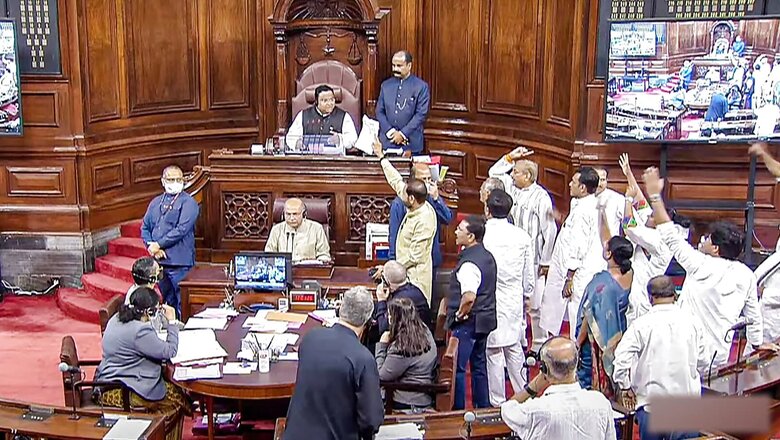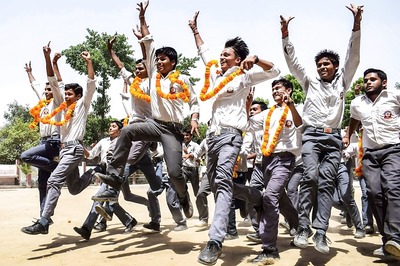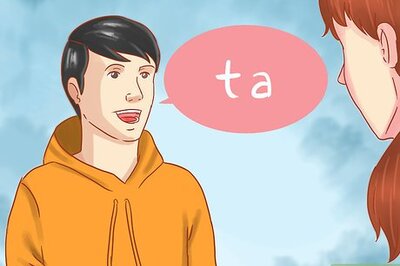
views
The Monsoon Session of Parliament began with Vice-President M Venkaiah Naidu’s observation that the majority of sittings in the last 13 sessions had been disrupted by MPs across parties. It fell on deaf ears, with disruptions and adjournments from the first day onwards, leading to the suspension of a record 27 MPs.
On Thursday, the Lok Sabha became a theatre of the absurd, erupting in sound and fury over an out-of-place letter of the English alphabet. A Congress MP referred to President Droupadi Murmu as ‘rashtrapatni’, a solecism that led to the Treasury benches targeting Congress president Sonia Gandhi. Boorish behaviour on both sides followed. It’s debatable whether the regrettable display earned any political capital for the principle actors, and with 32 Bills up for consideration, the House lost valuable time.
The deterioration of parliamentary democracy is reflected as much in the legislature’s declining productivity, owing largely to the conduct of our elected representatives, as the dilution of parliamentary procedures and the culture of accountability. Both the ruling party and Opposition must be held responsible.
Earlier this year, the Supreme Court had expressed concern over unruly behaviour by MPs, pointing out that debates in both Houses of Parliament had been reduced to jeering and personal attacks rather than erudite deliberations. Statesmanship, not brinkmanship, was called for.
The Lok Sabha reached its nadir in 2014, when MPs sought to intimidate the Treasury benches by dousing them in pepper spray, brandishing weapons, punching each other and damaging public property. Offences that would have attracted charges under Sections 146 (rioting) and 352 (violence) of the Indian Penal Code, if the incident had not taken place in Parliament.
While state legislatures have seen multiple incidents of violence, it was the first time that the Lok Sabha had witnessed a disruption of this kind. Alas, it was not the last. In March 2020, the Lok Sabha saw a scuffle over the Delhi riots and in August 2021, marshals had to intervene to restrain Rajya Sabha members from pushing and shoving.
Time lost to disruptions gradually increased from 5% in the 11th Lok Sabha to 30% in the 15th. The 16th Lok Sabha did better, bringing the figure down to 16%, but the 17th has seen an increase. The monsoon session last year clocked only 22% productivity, with 75 hours of disruptions.
Why do MPs misbehave? Two reasons come to mind. The first is the presence of cameras in the House, which allow MPs to grandstand for the benefit of their constituents. The louder and more dramatic they are, the more likely to attract attention.
The second is frustration. The purpose of Parliament is to keep an eye on the workings of government through constant questioning, debates and motions. The reduced referral of Bills to Standing Committees of Parliament, fewer sittings of both Houses and the tendency to use ordinances and railroad Bills (such as the Farm Laws of 2020) without adequate discussion have admittedly compromised this role. The Covid-19 pandemic made matters worse, with the suspension of Question Hour and Zero Hour.
Opposition MPs feel the ruling dispensation displays a hegemonistic behaviour that leaves them marginalised. They are not heard or given enough time to air their views. Faced with an unresponsive Treasury, they ‘act out’ and retaliate with unruly behaviour. Allowing the Opposition to set the agenda for a certain number of days in each session will certainly help matters.
That a Bill brought by the ruling dispensation will be passed is a foregone conclusion, given the NDA’s overwhelming majority in the Lok Sabha. But that doesn’t rule out an informed debate. The Opposition’s role is to hold the government accountable by highlighting its errors and by resorting to disruptions, they do themselves and their constituents a disservice. Bills are passed amid the clamour and discussions on important issues are lost.
The ruling party may be more inclined to give the Opposition space if the latter’s interventions are well-researched, concise and objective, instead of merely an attempt to score political points. The default mode is that any and every initiative of the government is suspect. Each MP must do his homework personally, or retain a research staff to provide relevant questions and draft informed speeches.
Lok Sabha Speaker Om Birla sought to instil decorum by bringing out an over-the-top booklet of unparliamentary expressions. He would have done better to suggest enforcement of the code of conduct for legislators, both inside and outside the House. The ghastly incident of a senior Air India official being beaten up by a Shiv Sena MP in 2017 must never be repeated.
Suggestions such as increasing the number of working days, maintaining a well-publicised productivity metre, suspending those who rush to the Well of the House, and activating the largely dormant ethics committee of both Houses will also improve the atmosphere.
Bhavdeep Kang is a freelance writer and author of ‘Gurus: Stories of India’s Leading Babas’ and ‘Just Transferred: The Untold Story of Ashok Khemka’. A journalist since 1986, she has written extensively on national politics. The views expressed in this article are those of the author and do not represent the stand of this publication.
Read all the Latest News and Breaking News here


















Comments
0 comment